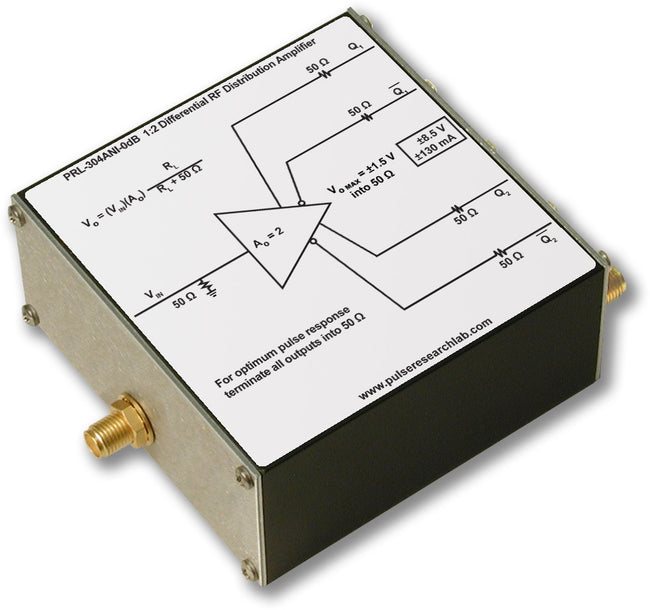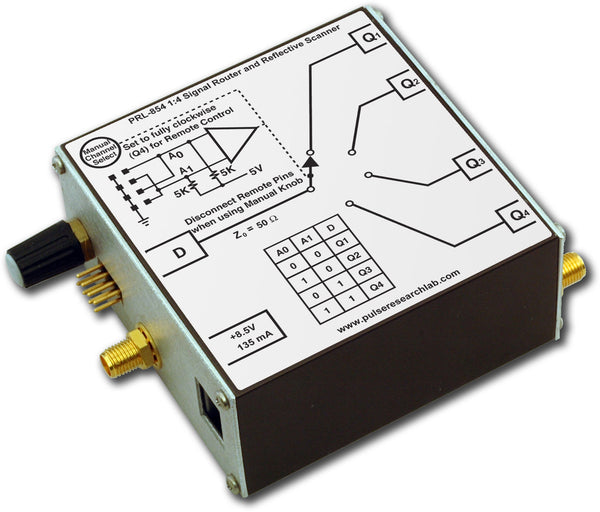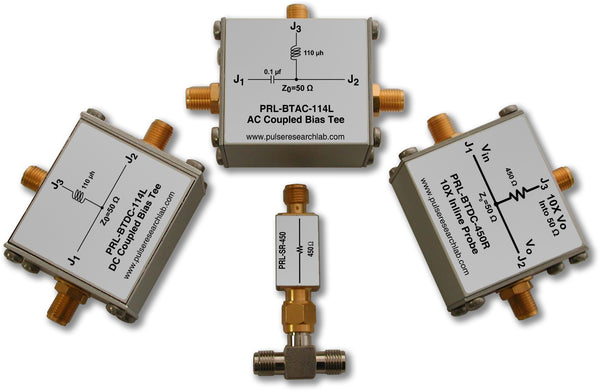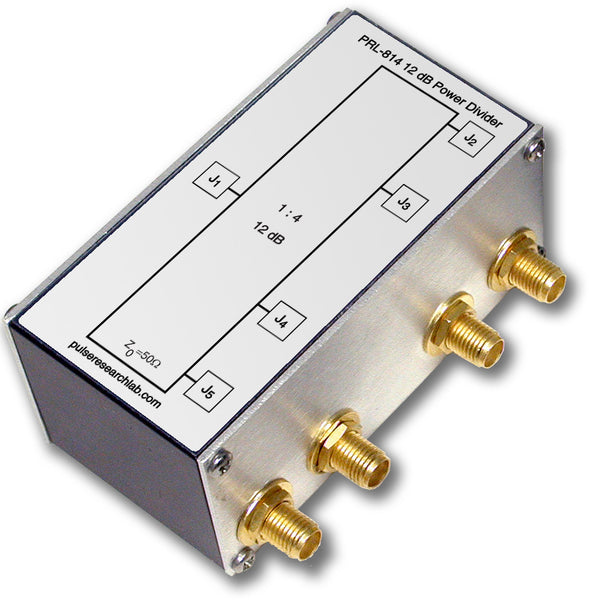Applications:
|
|
Features:
|
|
DescriptionThe PRL-304ANI-0dB is a 0 dB gain, DC-coupled 1:2 differential output RF splitter amplifier. It converts a single-ended input into two pairs of identical differential outputs. The gain match between any pair of differential outputs is 0.5 dB typical @ 10 MHz, and the small signal bandwidth is 412 MHz typical. Maximum output is ±1.5 V, or 3.0 VPP into 50 Ω. Each output is 50 Ω back-terminated, and the input has a 50 Ω-to-ground termination. The 0 dB gain, VO = V IN (RL = 50 Ω), allows multiple amplifiers to be cascaded for signal distribution applications. The PRL-304ANI-0dB has been optimized both for pulse response and for CW response, so that output overshoots and ringing for a fast pulse input are much smaller compared to those from amplifiers designed mainly for CW applications. With a 50 Ω back termination at each output, the amplifier can drive long transmission lines with or without load terminations. For optimum output response all outputs should be terminated into 50 Ω. The PRL-304ANI-0dB is housed in a 1.3H x 2.9W x 2.9L-in. aluminum enclosure, and four amplifier modules can share a single PRL-760E, 4-output ±9.0 V AC/DC adapter. Besides the I/O and power connections, no other set up or connection is required. The PRL-304ANI-0dB is a part of the PRL family of Mini Modular Instruments (MMIs). Note: The PRL-304ANI-0dB replaces the discontinued PRL-304NI-0dB. The PRL-304ANI-0dB is functionally equivalent, but with better channel-to-channel isolation. The form factor is longer (2.9" vs 2.2") and the power consumption is approximately 10% higher. The PRL-304NI-0dB is no longer available for sale. |
[powr-comments id=fbe6ed66_1487098397] pulseresearchlab
 Fig. 1: PRL-304ANI-0dB Top Cover Decal
Fig. 1: PRL-304ANI-0dB Top Cover Decal(0° C ≤ TA ≤ 35° C)*
| Symbol | Parameter | Min | Typ | Max | Unit |
|---|---|---|---|---|---|
| RIN | Input Resistance | 49.5 | 50.0 | 50.5 | Ω |
| ROUT | Output Resistance | 49.5 | 50.0 | 50.5 | Ω |
| AO | Open Circuit Voltage Gain, RL > 1 MΩ | 2 | |||
| AL | Loaded Voltage Gain, RL = 50 Ω | 1 | |||
| AdB | Voltage Gain in dB | 0 | dB | ||
| ΔV | Differential Gain Match @ 10 MHz, 1 VPP Sinewave Input | 0.5 | dB | ||
| IDC1 | Quiescent DC Input Current VIN = 0 V | ±50 | ±60 | mA | |
| IDC2 | DC Input Current @ 100MHz, VO = ±1.5 V into 50 Ω | ±125 | ±135 | mA | |
| VDC | DC Input Voltage | ±7.5 | ±8.5 | ±12.0 | V |
| VAC1 | AC/DC Adapter Input Voltage, switched to “120 V” | 103 | 115 | 127 | V |
| VAC2 | AC/DC Adapter Input Voltage, switched to “230 V” | 206 | 230 | 254 | V |
| tPLH | Propagation Delay to output ↑ | 1.8 | ns | ||
| tPHL | Propagation Delay to output ↓ | 1.8 | ns | ||
| tr1/tf1 | Small Signal Rise/Fall Times (VO = ±200 mV) | 850 | 1000 | ps | |
| BW1 | Small Signal 3 dB Bandwidth | 350 | 412 | MHz | |
| tr2/tf2 | Large Signal Rise/Fall Times (VO = ±1.25 V) | 1.25 | 1.50 | ns | |
| BW2 | Large Signal 3 dB Bandwidth | 233 | 280 | MHz | |
| tSKEW | Skew between any two outputs @ 25 MHz | 100 | 250 | ps | |
| VIN MAX DC | Maximum Input, DC Coupled | -2.0 | ±2.0 | 2.0 | V |
| VIN MAX AC | Maximum Input, AC Coupled | 3.8 | 4.0 | 4.0 | VPP |
| VO MAX | VO maximum, all outputs terminated into 50 Ω | 3.0 | 4.0 | 4.2 | VPP |
| Size | 1.3 x 2.9 x 2.9 | in | |||
| Weight, w/o AC adapter | 5 | Oz | |||
| Shipping weight, w/AC adapter | 4 | lb | |||




